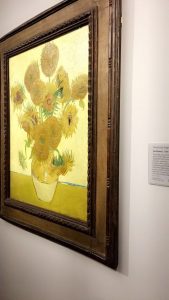 Looking upon Vincent van Gogh’s paintings for the first time, I found myself incredibly moved. In a gallery of paintings and portraits featuring naked babies or figures from myth and legend, I was so drawn—perhaps inexplicably—to van Gogh’s Long Grass with Butterflies, Van Gogh’s Chair, or (my favourite) Sunflowers.
Looking upon Vincent van Gogh’s paintings for the first time, I found myself incredibly moved. In a gallery of paintings and portraits featuring naked babies or figures from myth and legend, I was so drawn—perhaps inexplicably—to van Gogh’s Long Grass with Butterflies, Van Gogh’s Chair, or (my favourite) Sunflowers.
In Nottingham, I watched my new friend (a visual artist) peer closely at the paintings in the museums at Oxford. When I asked her why, she explained that she was interested in the brush strokes and how smooth they were. With that being said, and upon closer inspection, I realized that what I was looking at was actually manufactured light and shadow, that brush strokes should be evident, though they weren’t unless you looked closely.
Among other reasons, perhaps exceptionally thick brush strokes were why I was so drawn to van Gogh’s paintings. My first thought, almost exactly, was “Like a child.” Looking at van Gogh’s art, I found myself thinking of children finger painting with reckless abandon. I felt like the paintings evoked a sense of desperate aliveness, in contrast to what I knew about van Gogh’s life. (Thanks, Doctor Who.) More than that, van Gogh’s attention to colour was nothing else like I’d seen: I tired of the chiaroscuro style I saw in the previous gallery with Rembrandt, where I couldn’t see certain parts of the painting depending on the gallery light and where I was standing (and I liked to stand close to paintings now, to see brushstrokes, as you know). With van Gogh, everything is bright no matter where you stand… even the darkness, somehow.
I truly appreciated that everyone was drawn to Sunflowers. For a man with such a turbulent life to be remembered for the sunniest of paintings… I was so moved, so grateful that I got to be one of those people drawn to the simple vase of flora, to look so closely that I can see his brush strokes.
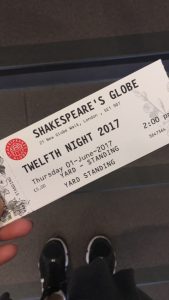 I wasn’t expecting to love Shakespeare’s Globe as much as I do. Watching Twelfth Night was not as I expected—for one thing, the show was quite a diversion from the original text—but I was delighted nonetheless, and watching the play was certainly worth standing for hours. (Although I might splurge on a ticket with a seat next time.)
I wasn’t expecting to love Shakespeare’s Globe as much as I do. Watching Twelfth Night was not as I expected—for one thing, the show was quite a diversion from the original text—but I was delighted nonetheless, and watching the play was certainly worth standing for hours. (Although I might splurge on a ticket with a seat next time.)
The experience was a marriage of my top interests during my grade 12 year of high school, which was composed of late nights at the theatre and taking as many English courses as my school allowed. Because of this, my younger self was having a grand ol’ time at the Globe, although my current self certainly was, too. The Globe’s production of Twelfth Night turns the play into somewhat of a triple threat exhibition, and I was happy to be able to marvel at the amazing dance and song as much as their acting.
Anyone who knows me knows that my favourite thing, in general, comes in any form of top-notch storytelling, which Twelfth Night certainly was. You don’t have to understand Elizabethan or Shakespearean English to laugh at the jokes, to cry when the characters cry, to feel the sense of dramatic urgency or irony that the play creates. So the production was a success in my books.
I’ve discovered that the experience of art at its best is necessarily intimate. Leaning against the Globe stage, I could look into Orsino’s eyes, see Malvolio’s feet shuffle with every stressed syllable, hear Maria’s voice from her mouth rather than the speakers, even see Feste spit out his words on every bilabial stop. (Thanks, ENGL 330, for teaching me about bilabial stops.) These moments were when I forgot how tired I was, how much I wanted to sit down. Being so close to see eyeliner, or nylon stockings, for only £5!
Although I can’t believe I come across toilets that cost (only 20p, but still!) to use, or that some restaurants charge more for sitting down at one of their tables, I love London for the culture it shares so generously. I didn’t have to pay a penny to see van Gogh, and I’ve paid more for some meals than I did to see such an excellent production of a Shakespeare play on the very site where Shakespeare himself once stood. And for that, I may have to forgive London for charging to use toilets or eat in at restaurants.
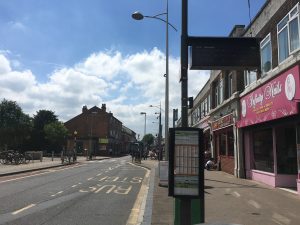 If home is found in the crevices of human experience, homesickness is most certainly found in the expanses of suitcase living: sharing a room, having to take toiletries with you to the bathroom and back, not being able to leave your belongings lying about. (Mommy, if you’re reading this: I leave my room messy because that’s just part of the experience of being at home!) I am excited to be able to leave my toothbrush on the bathroom counter, to unpack my clothes from my suitcase. (Maybe long-term solo travel isn’t for me after all. How distressing.)
If home is found in the crevices of human experience, homesickness is most certainly found in the expanses of suitcase living: sharing a room, having to take toiletries with you to the bathroom and back, not being able to leave your belongings lying about. (Mommy, if you’re reading this: I leave my room messy because that’s just part of the experience of being at home!) I am excited to be able to leave my toothbrush on the bathroom counter, to unpack my clothes from my suitcase. (Maybe long-term solo travel isn’t for me after all. How distressing.)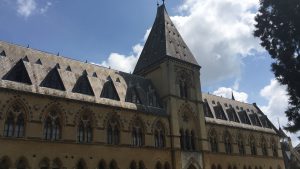 Having said that, though, I don’t think I can stress enough how much the English midlands and the English countryside felt like home to me. As we drove back from Chatsworth House, widely believed to be the inspiration for Mr. Darcy’s Pemberley in Jane Austen’s Pride and Prejudice (one of my favourite books), I looked around at the grids of farmland separated by stone walls and hedges and I found myself thinking about Dr. Dalziel’s Honours seminar on storytelling, and Thomas Hardy’s Far from the Madding Crowd.
Having said that, though, I don’t think I can stress enough how much the English midlands and the English countryside felt like home to me. As we drove back from Chatsworth House, widely believed to be the inspiration for Mr. Darcy’s Pemberley in Jane Austen’s Pride and Prejudice (one of my favourite books), I looked around at the grids of farmland separated by stone walls and hedges and I found myself thinking about Dr. Dalziel’s Honours seminar on storytelling, and Thomas Hardy’s Far from the Madding Crowd. British English literature, the literary genius that the discipline holds him up to be. You understand how the idea dismantles a great bulk of my academic field: though I am not the most familiar with Shakespeare’s works as far as an English major goes, and I am skeptical of the British white male canon in general, I was eager to make a pilgrimage to Shakespeare’s home.
British English literature, the literary genius that the discipline holds him up to be. You understand how the idea dismantles a great bulk of my academic field: though I am not the most familiar with Shakespeare’s works as far as an English major goes, and I am skeptical of the British white male canon in general, I was eager to make a pilgrimage to Shakespeare’s home.
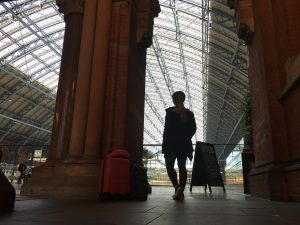
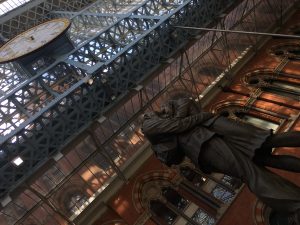 I relish in the thrill and accomplishment of getting around a new city successfully and with relative ease. So far, despite its bustling metropolitan-ness, London has been simple enough to navigate.
I relish in the thrill and accomplishment of getting around a new city successfully and with relative ease. So far, despite its bustling metropolitan-ness, London has been simple enough to navigate.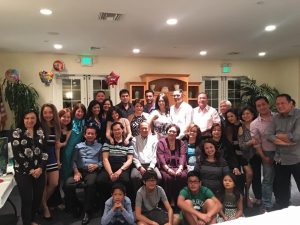 This spring, it was a reunion, with family coming from all over: us from Vancouver, and family from Toronto, New York City, and even the Philippines. I would be seeing my grandparents for the first time in a long time, and Nate would be coming with me. It was new this time, and it had been awhile: I was ready to go back to California.
This spring, it was a reunion, with family coming from all over: us from Vancouver, and family from Toronto, New York City, and even the Philippines. I would be seeing my grandparents for the first time in a long time, and Nate would be coming with me. It was new this time, and it had been awhile: I was ready to go back to California.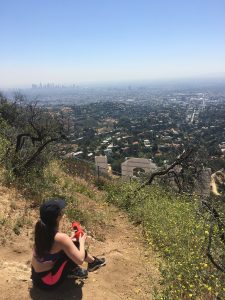 Much like how I imagine heaven to be, looking at the city of Los Angeles from above, it seems to go on forever. Sitting on the snow on Mount Seymour in Vancouver, you look out onto farmland and know that the city of Vancouver ends somewhere, but from the Hollywood Hills in Los Angeles you cannot even see the water. All you can see are a cluster of tall buildings in the distance, glittering freeways, and houses and civilization leaking over the edge of the world.
Much like how I imagine heaven to be, looking at the city of Los Angeles from above, it seems to go on forever. Sitting on the snow on Mount Seymour in Vancouver, you look out onto farmland and know that the city of Vancouver ends somewhere, but from the Hollywood Hills in Los Angeles you cannot even see the water. All you can see are a cluster of tall buildings in the distance, glittering freeways, and houses and civilization leaking over the edge of the world. Vancouver’s palette for me contains blues, grays, and greens, but if you paint my school in warmer colours, I believe you’d be painting UCLA—we share school colours, after all, cool blue and warm gold. Being among books, like in the gorgeous Powell Library, or talking about Shakespeare with an academic, that feels like home. That feels like my normal.
Vancouver’s palette for me contains blues, grays, and greens, but if you paint my school in warmer colours, I believe you’d be painting UCLA—we share school colours, after all, cool blue and warm gold. Being among books, like in the gorgeous Powell Library, or talking about Shakespeare with an academic, that feels like home. That feels like my normal. I appreciate these rare chances when I have no choice but to take my time, to use my own two feet, to clear my own path, and to go slowly. I am always on my way somewhere, and almost always I am in a rush, but when it snows, I am slow for once.
I appreciate these rare chances when I have no choice but to take my time, to use my own two feet, to clear my own path, and to go slowly. I am always on my way somewhere, and almost always I am in a rush, but when it snows, I am slow for once.